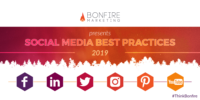Over the past few years, Facebook News Feed’s organic reach diminished to nearly zero. So, the latest news about Facebook cutting pages off shouldn’t come as a shock. I won’t discuss the pros or cons of the change. Let’s focus on the downstream effects that might occur as a result.
Facebook is—and has been for years—a primary source for news about people, places, and things. It turned into the Grand Central Station for information about the world around us. Algorithms were developed to serve up only what we liked best based on affiliation, time, and relevancy. But people and organizations quickly learned how to game the feed. Where Google has over 500+ algorithmic updates per year to keep “gamers” at bay, Facebook would only make adjustments once or twice yearly.
In my view, Facebook isn’t competing with other social networks. They’re now competing with all media companies. And if they want to compete with media, this algorithmic adjustment could seriously damage their chances to win against their competition.
Community, Content, Discovery
A media company’s strengths can be broken into three categories: community, content, and access. If a media company has all three, it’s very difficult for competitors to make headway. Let’s explore how this change from Facebook can adjust their position in the media landscape.
Community
Facebook has community in spades. With over 82 percent of all online users active ages 18 to 29 (It’s 79 percent for 30 to 49-year-olds) on Facebook, they rule the market. The algorithm adjustment only strengthens this community as users will see information from their friends and family at a higher frequency. This is great for strengthening societal bonds and helps Facebook ward off pages with influence motives.
YouTube, Netflix, and Twitter wish they had community as strong as Facebook, but attempts by YouTube (Google+), lack of attempts by Netflix, and the general chaos of Twitter have made them non-factors in this area. Cutting off pages from the newsfeed will strengthen Facebook’s community in the short term, but without new content, will people go elsewhere to spend their time?
Content
Content is where Facebook falls very short. Although Facebook is trying, they currently have little to no original content. Google, Netflix, Amazon, HBO, and most other media companies are investing heavily to draw audiences to sticky content. They all realize the advantages of building content. It draws a crowd and establishes an exclusive advertising network for reach.
I believe YouTube is clearly leading the infrastructure race in this area and, once they figure out original content, will be the market leader. Netflix is losing a large amount of outstanding content with Disney pulling everything off their network to build their own. Amazon largely makes content so people sign up for Amazon Prime and buy more stuff. HBO is hedging cord cutters (with HBO GO) and licensing disputes by creating original programming. Facebook has original programs in the works and licensing deals with sports, but so far nothing has taken off. If they see their Daily Active Users (DAUs) drop with less discovery on the platform, look for some serious investment on original programming or for them to invite preferred platform members access to the network without the algorithm restrictions.
Discovery
The location where people discover content is extremely important to ad prices. If Facebook just reduced organic discovery to create a newsfeed echo chamber, online users are going to spend their time elsewhere. YouTube has a very strong discovery engine for User-Generated Content (UGC) and original programming. Netflix has leveraged machine learning to suggest shows and movies based on your viewing habits. Google saves your search behavior to provide results relevant to time, place and history. Facebook is now relying on users to share information. That could place a higher emphasis on external website share buttons (which, behaviorally, might have come and gone) and your friends that share the most. Again, their efforts might make it a lot noisier from a select few, which in turn could lower their DAUs.
Even before this change, Facebook was having its share of problems. Younger generations see it as an older network, Facebook was reaching saturation in the world, and they were running out of real estate to place ads. Recently, I watched the preview for the Olympics (discovered on Netflix) and when all athletes were asked what their favorite social app was, not one said Facebook. One figure skater even said Facebook was for old people. This should be very troubling for Facebook. Even though they own Instagram and WhatsApp, a majority of their revenue comes from the Facebook platform.
As a marketer, Facebook cannot and should not be ignored. Changes like these should be taken advantage of. But, if this trend continues, original content and marketers might jump ship, and so might Facebook’s audience.
How to capitalize on Facebook’s algorithm change
- Marketers should look for:
- Short term
- Lower organic traffic from Facebook
- Higher organic traffic from Google
- Higher ad rates on Facebook, Google, and YouTube
- Fewer conversions from Facebook
- Higher conversions from Google
- Long Term
- Higher rates from all online channels
- Less organic and “viral” opportunities
- Short term
- Marketers should prepare by:
- Short term
- Testing new ad campaigns on Facebook and comparing them with existing campaigns. (Facebook might be providing cheaper CPC for new campaigns.)
- Analyzing conversion rates on specific channels using Google Analytics. (UTM segmented)
- Building content for advertising. Facebook limits copy on images.
- Long term
- Analyzing your target market’s buyer’s journey to see if Facebook is viable for your marketing goals.
- Building your email database to hedge against unowned online channel algorithm updates.
- Short term
There’s one plan, but what are your thoughts on this change? Are you doing something to respond to this differently? Comment below with your thoughts and ideas on this challenge we all face as marketers. Let’s get a dialogue going.
Further reading:
More Content
Fundamentals of Effective Marketing Reporting
Effective marketing isn’t based on hunches. That shouldn’t come as a shock to anyone, since we hear all the time about the importance of making data-informed decisions, regardless of what
5 Best Practices for a Hardware Product Launch
If you work in technology, you’re familiar with the hype around a new product launch. Hardware product launches these days are made for the digital world, and that means throwing
The Ultimate Social Media Best Practices 2019 [Infographic]
Jump ahead to best practices for: Facebook Posts Facebook Paid Posts LinkedIn Posts LinkedIn Sponsored Content Pinterest Pins Pinterest Promoted Pins YouTube Videos When I began my work with Bonfire,




Leave A Comment